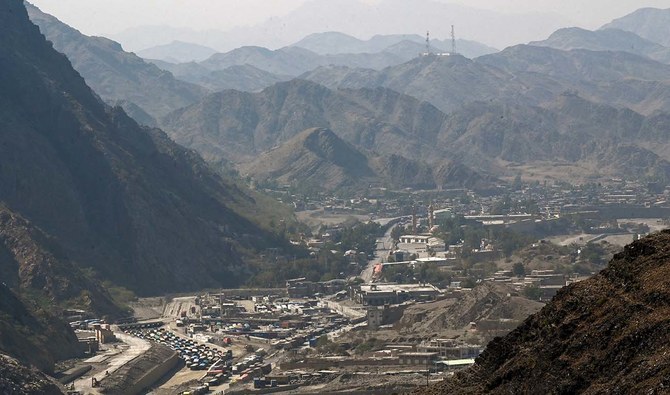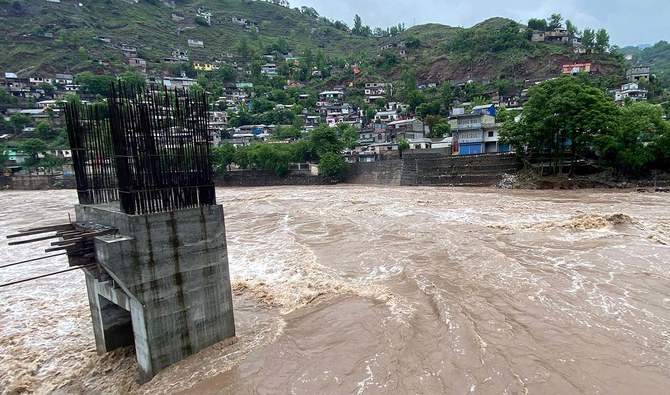ISLAMABAD: Pakistan is doing “our best” to improve counter-terror financing operations in line with an internationally agreed action plan, the finance ministry said on Saturday, a day after global watchdog, the Financial Action Task Force, gave Islamabad until October to complete the program.
Since June last year, FATF already has Pakistan on its “gray list” of countries with inadequate controls over curbing money laundering and terrorism financing. On Friday it said it was concerned Pakistan had failed to complete the agreed action plan first by a January deadline and then again by a May deadline.
If Pakistan does not comply with an agreed action plan by October this year, it could likely result in sanctions, which would hurt the country’s economy and exports. FATF will formally announce its decision in Paris after a plenary that starts on October 13.
“We are doing our best to implement the action plan agreed upon with FATF,” Dr. Khaqan Hassan Najeeb, Finance ministry spokesman, told Arab News.
“FATF strongly urges Pakistan to swiftly complete its action plan by October 2019 when the last set of action plan items are set to expire,” the watchdog said in a statement on Friday. “Otherwise, the FATF will decide the next step at that time for insufficient progress.”
Khurram Husain, business editor for Pakistan’s Dawn newspaper, said it seemed that Pakistan had been given one last chance to deliver on specific conditions laid down by the FATF.
“In the case of failure, it looks likely that there will be blacklisting of Pakistan in October,” he said, adding that being placed on the blacklist would make the country’s economic interactions with the outside world “very expensive.”
“At a time when the country is struggling to revive its exports, this [the blacklisting] will be yet another hurdle,” Husain said.
According to the 36-nation FATF charter, the support of at least three member states is essential to avoid blacklisting. India – Pakistan’s arch-rival and co-chair of the joint group of FATF and Asia Pacific Group – has been pushing for Islamabad to be downgraded from a grey to a black list.
FATF and other world powers have been pushing Pakistan since 2015 to initiate anti-money laundering and terrorism financing actions but “we have not been able to undertake them,” Dawn’s Husain said.
“Now there is a last chance that has been given [to Pakistan], and we have a few months to do what we have not been able to do in the last four years.”
FATF, he said, would no longer be satisfied with Pakistan simply “passing laws and regulations … [but was] looking for specific actions on the ground against specific entities.”
“We want Pakistan downgraded on the FATF list,” Indian Finance Minister Arun Jaitley told reporters in May.
The call came a day after India claimed a diplomatic victory with a UN Security Council committee blacklisting the founder of the Pakistan-based Jaish-e-Mohammed (JeM) militant group, Masood Azhar.
His group claimed responsibility for a February suicide bombing that killed at least 40 Indian paramilitary police in the Indian-controlled part of the disputed Kashmir region, an attack that brought the nuclear-armed neighbors to the brink of war.
Pakistan’s ally China had repeatedly opposed efforts at the United Nations by Western powers to directly sanction Azhar, even though the group had already been blacklisted by the UN Security Council in 2001.
Azhar’s freedom within Pakistan has been a sore point in the relationship between Western countries and Pakistan, and has led to repeated accusations by India that Islamabad uses and harbors militant groups to further its foreign policy agenda. Pakistan denies such accusations.
Senior columnist Mosharraf Zaidi said there was no imminent chance of Pakistan being blacklisted by FATF but urged the government to address the “factors” which had led to the country being included in the grey list.
“This [blacklisting of Pakistan] is not going to happen anytime soon as they [the world powers] still need Pakistan to do a lot for them [for peace in Afghanistan],” he told Arab News, referring to Pakistan’s role in a negotiated settlement to a 17-year-long war in neighboring Afghanistan. However, he cautioned that being put on a blacklist would stand “in the way of economic growth” and Pakistan should take FATF-defined actions in the national interest.
FATF has asked Pakistan to work on implementing its action plan to address its strategic deficiencies, including by: (1) adequately demonstrating its proper understanding of the TF (terror financing) risks posed by the terrorist groups , and conducting supervision on a risk-sensitive basis; (2) demonstrating that remedial actions and sanctions are applied in cases of AML/CFT (anti-money laundering/counter terrorist financing) violations, and that these actions have an effect on AML/CFT compliance by financial institutions; (3) demonstrating that competent authorities are cooperating and taking action to identify and take enforcement action against illegal money or value transfer services (MVTS); (4) demonstrating that authorities are identifying cash couriers and enforcing controls on illicit movement of currency and understanding the risk of cash couriers being used for TF; (5) improving inter-agency coordination including between provincial and federal authorities on combating TF risks; (6) demonstrating that law enforcement agencies (LEAs) are identifying and investigating the widest range of TF activity and that TF investigations and prosecutions target designated persons and entities, and persons and entities acting on behalf or at the direction of the designated persons or entities; (7) demonstrating that TF prosecutions result in effective, proportionate and dissuasive sanctions and enhancing the capacity and support for prosecutors and the judiciary; and (8) demonstrating effective implementation of targeted financial sanctions (supported by a comprehensive legal obligation) against all 1267 and 1373 designated terrorists and those acting for or on their behalf, including preventing the raising and moving of funds, identifying and freezing assets (movable and immovable), and prohibiting access to funds and financial services; (9) demonstrating enforcement against TFS violations including administrative and criminal penalties and provincial and federal authorities cooperating on enforcement cases; (10) demonstrating that facilities and services owned or controlled by designated person are deprived of their resources and the usage of the resources.
Pakistan says doing “our best” to curb terror financing as per FATF action plan
Pakistan says doing “our best” to curb terror financing as per FATF action plan

- Global watchdog gives Pakistan until October to improve counter-terror funding operations or face action
- Failing to complete action plan could lead to blacklisting and likely result in sanctions
Pakistan committee discusses development of border areas in inaugural session

- The committee was formed to devise comprehensive strategies for holistic development in Pakistan’s border regions
- Key topics that came under discussion at the inaugural session included tariff rationalization, employment creation
ISLAMABAD: A high-level committee tasked with development of Pakistan’s border regions on Saturday held its inaugural session in Islamabad to discuss the challenges facing communities based in the country’s frontier regions, the Pakistani commerce ministry said.
The inaugural session of the committee, which was formed to devise comprehensive strategies for holistic development in these areas, was presided over by Commerce Minister Jam Kamal Khan, according to the ministry.
Key topics that came under discussion at the meeting included tariff rationalization and employment creation, reflecting the committee’s commitment to addressing border communities’ challenges.
“The committee aims to present its recommendations to the Prime Minister within 10 days, signaling a promising start to collaborative efforts for socio-economic development in the region,” the commerce ministry said in a statement.
Pakistan shares a long, porous border with Iran and Afghanistan, with people live along it relying on cross-border trade with little or no government tariffs, quotas, subsidies or prohibitions.
Islamabad last year announced restrictions on the informal trade to discourage smuggling of goods and currency in order to support the country’s dwindling economy.
Pakistan’s trade with China mostly takes place through formal channels, while the country’s trade ties with India, another neighbor it shares border with, remain suspended since 2019 over the disputed region of Kashmir.
Pakistan records ‘wettest April’ in more than 60 years — weather agency

- Pakistan’s metrology department says April rainfall was recorded at 59.3 millimeters, ‘excessively above’ the normal average of 22.5 millimeters
- There were at least 144 deaths in thunderstorms and house collapses due to heavy rains in what the report said was the ‘wettest April since 1961’
ISLAMABAD: Pakistan experienced its “wettest April since 1961,” receiving more than twice as much rain as usual for the month, the country’s weather agency said in a report.
April rainfall was recorded at 59.3 millimeters, “excessively above” the normal average of 22.5 millimeters, Pakistan’s metrology department said late Friday in its monthly climate report.
There were at least 144 deaths in thunderstorms and house collapses due to heavy rains in what the report said was the “wettest April since 1961.”
Pakistan is increasingly vulnerable to unpredictable weather, as well as often destructive monsoon rains that usually arrive in July.
In the summer of 2022, a third of Pakistan was submerged by unprecedented monsoon rains that displaced millions of people and cost the country $30 billion in damage and economic losses, according to a World Bank estimate.
“Climate change is a major factor that is influencing the erratic weather patterns in our region,” Zaheer Ahmad Babar, spokesperson for the Pakistan Meteorological Department, said while commenting on the report.
While much of Asia is sweltering dure to heat waves, Pakistan’s national monthly temperature for April was 23.67 degrees Celsius (74 degrees Fahrenheit) 0.87 degrees lower than the average of 24.54, the report noted.
Fire erupts at Karachi garment factory, no loss of live reported

- The biggest Pakistani city, known for poor fire safety protocols, witnesses hundreds of such incidents annually
- In November last year, a blaze at a shopping mall in Karachi killed around a dozen people and injured several others
KARACHI: A fire broke out at a garment factory in the southern Pakistani city of Karachi on Saturday, rescue officials said.
The blaze erupted on the ground floor of the garment factory in Zarina Colony in the New Karachi area, according to Rescue 1122 service.
“One fire truck is actively participating in the operation,” a Rescue 1122 spokesperson said, adding that another fire tender has been called to the site.
No loss of life has been reported in the wake of the fire.
Karachi, Pakistan’s largest city and the main commercial hub, is home to hundreds of thousands of industrial units and some of the tallest buildings in the South Asian country.
The megapolis, known for its fragile firefighting system and poor safety controls, witnesses hundreds of such incidents annually.
In Nov., a blaze at a shopping mall killed around a dozen people and injured several others. In April last year, four firefighters died and nearly a dozen others were injured after a fire broke out at a garment factory, while 10 people were killed in a massive fire at a chemical factory in the city in August 2021.
In the deadliest such incident, 260 people were killed in 2012 after being trapped inside a garment factory when a fire broke out.
Saleem Haider Khan, Faisal Kundi named governors of Pakistan’s Punjab, Khyber Pakhtunkhwa provinces

- Nominations come as part of power-sharing deal between PM Sharif’s party and ex-FM Bhutto-Zardari-led faction
- According to the deal, the PPP backed Sharif for the prime minister’s office in return for constitutional positions
ISLAMABAD: The Pakistan Peoples Party (PPP), a coalition partner in Prime Minister Shehbaz Sharif’s government, has nominated Saleem Haider Khan and Faisal Karim Kundi as governors of Pakistan’s eastern Punjab and northwestern Khyber Pakhtunkhwa provinces, the PPP chairman announced on Friday.
The PPP forged an alliance with PM Sharif’s Pakistan Muslim League-Nawaz (PML-N) party after Pakistan’s national election on February 8 failed to present a clear winner.
According to the power-sharing deal, the PPP backed Sharif for the prime minister’s office in return for the presidency, chairman of Senate and other important constitutional positions.
In a post on X, PPP Chairman Bilawal Bhutto-Zardari congratulated Khan and Kundi, and extended his good wishes to them
“I am confident they [Khan and Kundi] will perform their duties with the dignity their new office demands,” he said on X.
In Pakistan, a governor is a representative of the state to a province, who is appointed by the president on the advice of the prime minister.
Such positions may seem ceremonial and symbolic, but they do hold significant constitutional importance.
At present, PML-N’s Balighur Rehman has been serving as the Punjab governor, while JUI-F’s Hajji Ghulam Ali holds the post in KP.
Bhutto-Zardari also called on PM Sharif in Islamabad, following the nominations, Pakistani state media reported.
“During the meeting, views were exchanged on overall political situation in the country and matters of national interest,” the Radio Pakistan broadcaster said.
Pakistan Cricket Board confirms details of national side’s South Africa tour

- The side will depart for Durban on December 2 after returning from Australia in Nov.
- The ODIs will be played from December 17-22 in Paarl, Cape Town, and Johannesburg
ISLAMABAD: The Pakistan Cricket Board (PCB) on Friday announced details of the Pakistan men’s cricket team’s tour of South Africa for three Twenty20, three one-day international and two Test matches in the second half of 2024.
Durban, Centurion, and Johannesburg will host the T20Is from December 10-14, according to the PCB. The ODIs will be played from December 17-22 in Paarl, Cape Town, and Johannesburg, while the two ICC World Test Championship 2023-25 matches will be held at Centurion (December 26-30) and Cape Town (January 3-7).
The side will depart for Durban on December 2 after returning from Australia on November 19, having featured in a series of three ODIs and three T20Is from November 4-18. After completing their African safari on January 8, Pakistan will take on New Zealand and South Africa in a three-nation ODI tournament on home turf, which will be followed by the eight-team ICC Champions Trophy 2025 in Pakistan.
“Prior to the tours of Australia and South Africa, Pakistan will host Bangladesh and England for two and three Tests, respectively,” the PCB said in a statement. “This means they will play seven Tests, minimum of 10 ODIs, and six T20Is in the six-month period from August 2024 to January 2025.”
This will be Pakistan’s seventh Test tour of South Africa since 1994-95. Their two Test wins were in the 1997-98 and 2006-2007 series.
In the Durban Test in 1997-98, Pakistan won by 29 runs at the back of centuries from Azhar Mahmood (132) and Saeed Anwar (118), match figures of nine for 149 by Mushtaq Ahmed and a first innings five-fer by Shoaib Akhtar. In the 2006-2007 Port Elizabeth Test, Pakistan won by five wickets with Inzamam-ul-Haq being named as Player of the Match for his 92 in the first innings.
In ODIs, Pakistan has won two of the last three series in 2013-2014 and 2020-21, while South Africa triumphed in 2002-2003 (4-1), 2006-2007 (3-1), 2012-2013 (3-2), and 2018-2019 (3-2).
In 12 T20Is to date, Pakistan leads 6-5 in head-to-head encounters, with one match ending in no-result.
Tour schedule:
10 Dec – 1st T20I, Durban
13 Dec – 2nd T20I, Centurion
14 Dec – 3rd T20I, Johannesburg
17 Dec – 1st ODI, Paarl
19 Dec – 2nd ODI, Cape Town
22 Dec – 3rd ODI, Johannesburg
26-30 Dec – 1st Test, Centurion
3-7 Jan – 2nd Test, Cape Town









